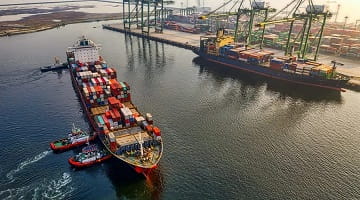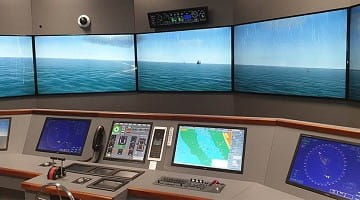2024/25 entry Applications also open for 2025/26
MSc, MSc (2 years Full-time) Maritime Operations Management
About this course
LJMU's internationally respected Maritime Operations Management MSc offers access to a world-renowned research institute and essential contacts for your future career.
- Study at one of the UK's leading Maritime Schools
- Access an international centre of excellence in maritime education and professional training
- Look forward to roles in consultancy, shipping company management, marine insurance management, ship broking and ship management
- Follow a curriculum informed by world-leading research plus links with the regional Mersey Maritime cluster, and the UK-wide maritime industry
- After graduating, enjoy exemptions from the Institute of Chartered Shipbrokers chartered membership examinations
Situated in the famous port city of Liverpool, LJMU has been offering maritime education for almost 125 years. Our University is also one of the only four or five institutions in the UK where you can undertake this kind of quality Masters programme.
During your studies you will gain the tools to be an effective project manager of shipping operations. You will also have the option to study law, port security management, and risk and asset management.
You will have the opportunity to broaden your experience with employer visits and lectures from guest speakers. Industrial visits and guest lecturers are an important part of the course, enabling you to understand the latest developments in the market and build a network of important contacts.
This programme is also available as a 2 year (240 credit) option. This consists of the standard 120 credits of taught modules plus 60 credits of MSc project, accompanied by an additional 60 credits. This can be taken as either a single semester group design project (a current module) or a sandwich placement year of 30 weeks (a current module).
Fees and funding
There are many ways to fund postgraduate study for home and international students
Fees
The fees quoted at the top of this page cover registration, tuition, supervision, assessment and examinations as well as:
- library membership with access to printed, multimedia and digital resources
- access to programme-appropriate software
- library and student IT support
- free on-campus wifi via eduroam
Additional costs
Although not all of the following are compulsory/relevant, you should keep in mind the costs of:
- accommodation and living expenditure
- books (should you wish to have your own copies)
- printing, photocopying and stationery
- PC/laptop (should you prefer to purchase your own for independent study and online learning activities)
- mobile phone/tablet (to access online services)
- field trips (travel and activity costs)
- placements (travel expenses and living costs)
- student visas (international students only)
- study abroad opportunities (travel costs, accommodation, visas and immunisations)
- academic conferences (travel costs)
- professional-body membership
- graduation (gown hire etc)
Funding
There are many ways to fund postgraduate study for home and international students. From loans to International Scholarships and subject-specific funding, you’ll find all of the information you need on our specialist postgraduate funding pages.
Please be aware that the UK’s departure from the EU may affect your tuition fees. Learn more about your fee status and which tuition fees are relevant to you.
Employability
Further your career prospects
LJMU has an excellent employability record with 96% (HESA 2018) of our postgraduates in work or further study six months after graduation. Our applied learning techniques and strong industry connections ensure our students are fully prepared for the workplace on graduation and understand how to apply their knowledge in a real world context.
During your study, you will be offered the opportunity to build industrial and commercial links for projects through guest lectures and industrial visits. There are excellent opportunities for roles such as consultants, managerial positions in shipping companies and the marine insurance industry, ship broking and ship management.
The student experience
Discover life as a postgraduate student at LJMU.
News and views
Browse through the latest stories and updates from the University and beyond
Course modules
Discover the building blocks of your programme
Your programme is made up of a number of core modules which are part of the course framework. Some programmes also have optional modules that can be selected to enhance your learning in certain areas and many feature a dissertation, extended report or research project to demonstrate your advanced learning.
Core modules
Research Methods
10 credits
The aims of this module are to develop the students’ ability to formulate a coherent and well- designed research project and associated proposal. The module also aims to develop the skills required to critically analyse and evaluate research findings and the effective presentation of the results.
Industrial Consultancy Project
60 credits
This module aims to provide you with an opportunity to work on an industrial driven project for an external (Industry) or internal (University) client to develop a solution to an open-ended problem presented by the client. It will require you to investigate a complex industry relevant work based problem, demonstrate initiative, and work together with the client to develop a design specification and project plan. You will select appropriate engineering and/or management processes and techniques to produce a solution which meets the specification.
MSc Project
60 credits
This module requires you to refine your aims, objectives and programme of work, and undertake research work with academic supervision. You will prepare a dissertation that demonstrates the appropriate application of research techniques in a suitable subject area at postgraduate level.
Project Management
10 credits
The central theme of this module is the management of projects using known standards and methodologies. It aims to develop a sound understanding of the fundamental concepts of managing projects. You are given the opportunity to develop your skills in a practical and theoretical context.
International Trade and Global Transport Systems
20 credits
This module will help you develop an understanding of the key influences affecting the international trade market, with particular reference to the impact they have on global logistics flows, and an insight into freight transport operations on an international scale, with particular reference to the role of intermodality, the law and practice in relation to export sales and the movement of goods.
Maritime Economics and Management
20 credits
The module is designed to provide a comprehensive overview of the topics including chartering, finance, economics, management, and operational considerations, which a shipping executive could deal with on a routine basis.
Optional Modules
Marine Maintenance and Asset Management
20 credits
The aim of this module is to provide knowledge about how the maintenance and repair of an offshore installation, vessel or a fleet of vessels is managed. In particular, it is intended to consider the lifecycle of a vessel and how maintenance is planned, scheduled and executed.
Operations Research
20 credits
This module introduces a set of fundamental techniques and tools to assist engineers and managers in making better decisions on real world management/business problems.
Logistics and Supply Chain Management
20 credits
This module provides an insight into the principles of logistics and supply chain management with particular reference to its application in the global business environment.
Port Management
20 credits
This module provides students with an overview of the global port industry and the evolving role of ports. Students will gain appreciation of the diverse functions of port authorities and examine the public interests and commercial factors that influence the administration of ports at national level, and governance of ports at the corporate level. This module examines a range of contemporary issues in the field of maritime and port security through the analysis of a series of relevant case studies. Students are introduced to some of the overarching legislation and are able to appraise its effectiveness.
Law and Marine Insurance
20 credits
This module introduces students to core principles of law with ‘wet’ maritime law, serving as an example of how civil and criminal liabilities can arise from the marine business. Having considered these liabilities, examination is made of established principles of the Marine Insurance. Analysis of the Marine Insurance Act 1906 and the implications of the Insurance Act 2015 reforms are made using case law developments. The options for alternative policy terms available via the Institute Clauses are also reviewed.
Chartering and Carriage of Goods Law
20 credits
This module develops students understanding of legal issues through an applied examination of carriage of goods and export sales
Maritime and Offshore Safety Analysis
20 credits
This module aims to enable you to understand and implement the requirements of formal safety design, assessment and review in marine, offshore and port areas.
Professional and Leadership Skills
10 credits
This module will help you to develop an awareness of the legal and ethical framework surrounding the activities of a professional engineer. You will also gain an awareness of the Emotional Competence Framework for a professional engineer. This will help you to develop a specific set of personal and social competency skills appropriate for a professional engineer, such as adaptability, creativity diversification, leveraging diversity, political awareness, leadership and team capabilities.
Conventional Fuels and Alternative Energy Sources
20 credits
This module recognises that the ways in which the maritime industry fuels vessels and the wider maritime sector is changing. In the light of rapidly shifting regulation and stringent goals for decarbonisation, the module will consider what the prospects are for new alternative fuels and how the maritime industry will adapt.
Marine Environmental Protection
10 credits
This module aims to provide the students with an opportunity to evaluate the impact of ship and port operations on climate change and global warming and propose measures to promote safe, secure, environmentally sound, efficient and sustainable shipping.
Maritime Cybersecurity
10 credits
This module aims to provide operational knowledge of the IT and other systems so that their vulnerabilities can be identified, and cyber-attack risks mitigated.
Energy Efficiency (Ships and Ports)
20 credits
This semester long module aims to provide the student with an opportunity to propose energy efficiency measures and systems that could be implemented at sea and/or in ports, based on an appraisal of current practices.
Marine Technology Management
20 credits
Teaching
An insight into teaching on your course
Teaching methods
Teaching on this course comprises lectures and directed student-centred learning. You will also complete open-ended reports and project work to demonstrate your understanding of topics.
Applied learning
Industrial visits are an important part of the course enabling you to understand developments in the market. They typically include: ports, ship visits, insurance underwriters (usually in London), P&I Club and the IMO.
Assessment
How learning is monitored on your programme
To cater for the wide-ranging content of our courses and the varied learning preferences of our students, we offer a range of assessment methods on each programme.
Assessment on this programme is via a combination of coursework with case study reports, assignment submissions and short class tests. Some modules also test problem solving skills through a combination of unseen written exams.
Course tutors
Our staff are committed to the highest standards of teaching and learning
Dr Sean Loughney
Programme Leader
After undergoing Deck Officer Training in the UK Merchant Navy, Robyn undertook a BSc(Hons) Maritime Business and Maritime Law at Plymouth University. She then completed an MSc and PhD as part of an Economic and Social Research Council scholarship. This looked into the implementation of the International Maritime Organisations Standards of Training Certification and Watch Keeping (STCW) Convention and its implementation at Maritime Higher Education institutions in China. Robyn worked for a period as a member of faculty at Dalian Maritime University in China, assisting with the delivery of a World Maritime University MSc programme in Maritime Safety and Environmental Management.
Something I enjoy in my role is the international and multidisciplinary learning environment offered in the department, and the contribution our students make to this. We have a wealth of academic and industry expertise and produce graduates with the necessary knowledge, skills and behaviours. Our students are able to develop and technical knowledge and skills, and the appropriate Logistics and Maritime Management business acumen.
-
 Reader
Reader -
 Programme Leader
Programme Leader -
 Reader
Reader
School facilities
What you can expect from your School
The Department of Maritime and Mechanical Engineering is located in the Byrom Street site of LJMUs City Campus. In addition to specialist engineering facilities, Byrom Street has high quality lecture theatres, meeting and seminar rooms plus a large café and social spaces. The Avril Robarts Library is just minutes away on Tithebarn Street.
Entry requirements
You will need:
Qualification requirements
Undergraduate degree
- An honours degree or equivalent in Maritime, Transport, Logistics, Business, Management or related studies.
Alternative qualifications considered
- A level 5 qualification and significant relevant industrial experience may be considered.
or
- Applicants with an unclassified degree and significant relevant industrial experience may be considered.
or
- Evidence of experiential learning in the maritime industry, such as a Master Mariner certificate.
or
- Other qualifications considered by the course team to be of similar academic level to the above.
or
- A non-UK equivalent qualification
International requirements
-
IELTS
- IELTS English language requirement: 6.0 (minimum 5.5 in each component)
Further information
- Extra Requirements
-
RPL
- RPL is accepted on this programme
Application and selection
Securing your place at LJMU
To apply for this programme, you are required to complete an LJMU online application form. You will need to provide details of previous qualifications and a personal statement outlining why you wish to study this programme.
You need to demonstrate that you have a sufficient level of knowledge to embark on the programme and to complete it within the time limits. You should provide evidence, at the interview stage, of your learning capabilities and commitment to a postgraduate programme of study.
Applications from non-standard applicants are welcomed. In exceptional circumstances applications by mature healthcare practitioners without sufficient qualifications will be considered.
The University reserves the right to withdraw or make alterations to a course and facilities if necessary; this may be because such changes are deemed to be beneficial to students, are minor in nature and unlikely to impact negatively upon students or become necessary due to circumstances beyond the control of the University. Where this does happen, the University operates a policy of consultation, advice and support to all enrolled students affected by the proposed change to their course or module.











